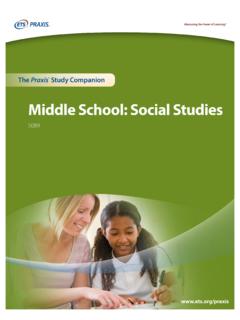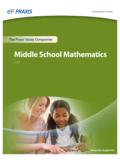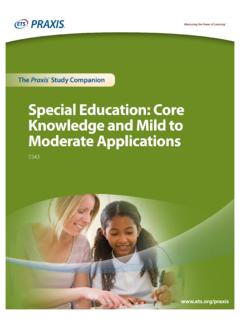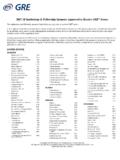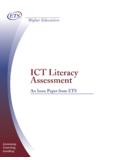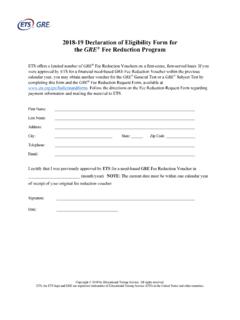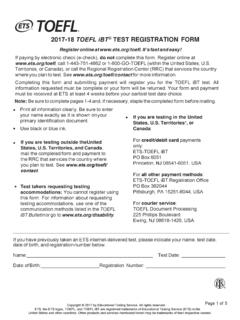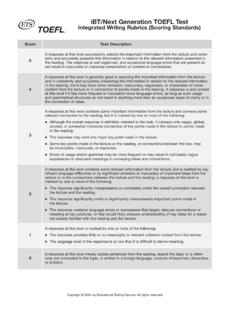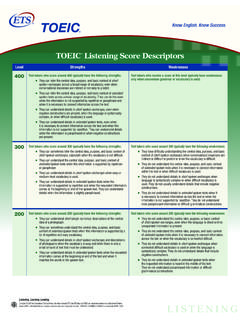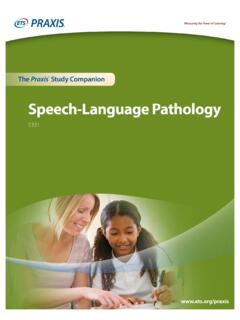Transcription of School Psychologist Study Companion - ETS Home
1 School Psychologist praxis Study CompanionThe praxis Study Companion2 Welcome to the praxis Study CompanionWelcome to The praxis Study Companion Prepare to Show What You KnowYou have been working to acquire the knowledge and skills you need for your teaching career. Now you are ready to demonstrate your abilities by taking a praxis test. Using The praxis Series Study Companion is a smart way to prepare for the test so you can do your best on test day. This guide can help keep you on track and make the most efficient use of your Study Study Companion contains practical information and helpful tools, including: An overview of the praxis tests Specific information on the praxis test you are taking A template Study plan Study topics Practice questions and explanations of correct answers Test-taking tips and strategies Frequently asked questions Links to more detailed informationSo where should you start?
2 Begin by reviewing this guide in its entirety and note those sections that you need to revisit. Then you can create your own personalized Study plan and schedule based on your individual needs and how much time you have before test in mind that Study habits are individual. There are many different ways to successfully prepare for your test. Some people Study better on their own, while others prefer a group dynamic. You may have more energy early in the day, but another test taker may concentrate better in the evening. So use this guide to develop the approach that works best for teaching career begins with preparation. Good luck!Know What to ExpectWhich tests should I take? Each state or agency that uses the praxis tests sets its own requirements for which test or tests you must take for the teaching area you wish to you register for a test, confirm your state or agency s testing requirements at are the praxis tests given?
3 praxis tests are given on computer. Other formats are available for test takers approved for accommodations (see page 40).The praxis Study Companion3 Welcome to the praxis Study CompanionWhat should I expect when taking the test on computer?When taking the test on computer, you can expect to be asked to provide proper identification at the test center. Once admitted, you will be given the opportunity to learn how the computer interface works (how to answer questions, how to skip questions, how to go back to questions you skipped, etc.) before the testing time begins. Watch the What to Expect on Test Day video to see what the experience is and when are the praxis tests offered?You can select the test center that is most convenient for you. The praxis tests are administered through an international network of test centers, which includes Prometric Testing Centers, some universities, and other locations throughout the schedules may differ, so see the praxis Web site for more detailed test registration information at The praxis Study Companion4 Table of ContentsTable of ContentsThe praxis Study Companion guides you through the steps to success1.
4 Learn About Your Test ..5 Learn about the specific test you will be taking2. Familiarize Yourself with Test Questions ..10 Become comfortable with the types of questions you ll find on the praxis tests3. Practice with Sample Test Questions ..14 Answer practice questions and find explanations for correct answers4. Determine Your Strategy for Success ..24 Set clear goals and deadlines so your test preparation is focused and efficient5. Develop Your Study Plan ..27 Develop a personalized Study plan and schedule6. Review Study Topics ..31 Review Study topics with questions for discussion7. Review Smart Tips for Success ..38 Follow test-taking tips developed by experts8. Check on Testing Accommodations ..40 See if you qualify for accommodations that may make it easier to take the praxis test9. Do Your Best on Test Day ..41 Get ready for test day so you will be calm and confident10. Understand Your Scores ..43 Understand how tests are scored and how to interpret your test scoresAppendix: Other Questions You May Have.
5 45 The praxis Study Companion5 Step 1: Learn About Your Test1. Learn About Your TestLearn about the specific test you will be takingSchool Psychologist (5402)Test at a GlanceTest Name School PsychologistTest Code 5402 Time 140 minutesNumber of Questions 140 Format Selected-response questionsTest Delivery Computer delivered Approximate Approximate Content Categories Number of Percentage of Questions Examination I. Professional Practices, Practices that 42 30% Permeate All Aspects of Service Delivery II. Direct and Indirect Services for Children 32 23% Families, and Schools (Student-Level Services III. Systems-Level Services 22 16% IV. Foundations of School Psychological 44 31% Service DeliveryIVIIIIIIA bout This TestThe praxis School Psychologist test is based on the National Association of School Psychologists (NASP) Model for Comprehensive and Integrated School Psychological Services (2010) and is designed for candidates seeking licensure or certification as School psychologists in educational settings.)
6 The test assumes that candidates have had some form of supervised practicum or internship 140 selected-response questions focus on both content and process issues that are relevant to the School setting. The test content includes the areas of professional practices, practices that permeate all aspects of service delivery; direct and indirect services for children, families, and schools (student-level services); systems-level services; and foundations of School psychological service test may contain some questions that will not count toward your : The fifth edition of the Diagnostic and Statistical Manual of Mental Disorders (DSM-5) was published in May 2013 with revisions to the criteria for the diagnosis and classifications of mental disorders. In the interest of fairness, and to allow time for educator preparation programs to integrate such changes into their curricula, praxis test materials will continue to reference the terminology, criteria, and classifications referred to in the fourth edition of the Diagnostic and Statistical Manual of Mental Disorders (DSM-IV-TR) until further praxis Study Companion6 Step 1: Learn About Your TestI.
7 Professional Practices, Practices that Permeate All Aspects of Service DeliveryA. Data-Based Decision Making and Accountability1. Problem identificationa. knows various interview strategiesb. knows various observational strategiesc. understands appropriate use of background information ( , student records, medical records and reports, review of previous interventions, development history)d. understands appropriate use and interpretation of screening measures and methods2. Assessment and problem analysisa. understands theories of intelligence and the appropriate use and interpretation of measures of intellectual/cognitive functioningb. understands appropriate use and interpretation of measures of educational achievementc. understands appropriate use and interpretation of diagnostic/processing measures ( , memory, executive functioning, phonemic awareness)d. understands appropriate use and interpretation of measures of development and adaptive behaviore.
8 Understands appropriate use and interpretation of measures of affective/social/emotional functioning and behaviorf. knows appropriate use and interpretation of a functional behavioral assessmentg. is familiar with performance-based assessment ( , work samples, portfolios)h. understands appropriate use and interpretation of curriculum-based assessment/curriculum-based measuresi. knows appropriate use and interpretation of ecological assessment ( , classroom, family, community characteristics)j. knows how to use information and technology resources to enhance data collection and decision makingk. understands the use of ongoing data collection to systematically assess the quality and effectiveness of academic, mental health, and system-level services ( , intervention design and implementation, progress monitoring, treatment fidelity/integrity, learning outcomes)3. Knowledge of measurement theory and principlesa. knows to use a problem-solving framework as the basis for all professional activitiesb.
9 Understands different types of test scores and normsc. knows the strengths and limitations of various types of assessment procedures ( , self-report tests and inventories, multiple-choice tests, interviews)d. is familiar with the principles of reliability and validitye. is familiar with personal, social, linguistic, environmental, racial, and cultural factors that may influence assessment proceduresf. knows about test fairness concepts4. Assessment of special populationsa. is familiar with infant and early childhood/preschool assessment proceduresb. knows appropriate use and interpretation of assessment procedures for English as a second language/English-language learners ( , the appropriate use of translators/interpreters, measurement selection, language of assessment)c. is familiar with the assessment of students with low-incidence exceptionalities ( , chronic health impairments, severe physical disabilities, autism spectrum disorders, sensory impairments)d.
10 Is familiar with screening for the gifted and talentedTest SpecificationsTest specifications in this chapter describe the knowledge and skills measured by the test. Study topics to help you prepare to answer test questions can be found in 6. Review Study Topics on page praxis Study Companion7 Step 1: Learn About Your TestB. Consultation and Collaboration1. Models and methods of consultation used for planning, implementing, and evaluating academic interventions and mental health servicesa. knows to use a problem-solving framework as the basis for all consultation and collaboration activities when planning, implementing, and evaluating academic and mental health servicesb. knows the various models of consultation ( , behavioral, mental health, instructional, organizational)c. knows the importance of facilitating communication and collaboration among diverse stakeholders ( , School personnel, families, community professionals, etc.)

